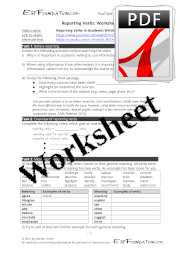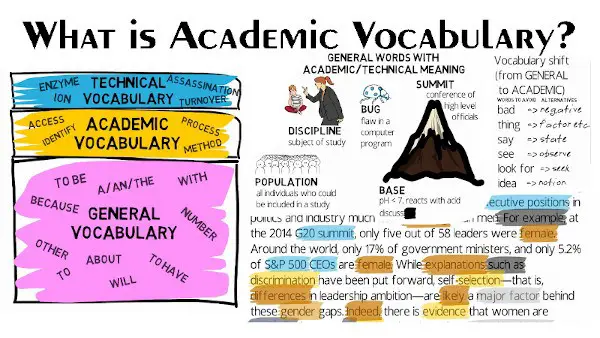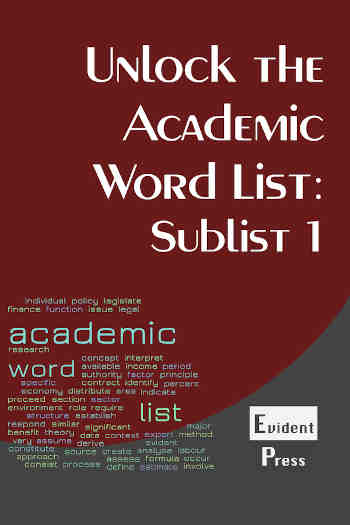Show AWL words on this page.
Show sorted lists of these words.


 







|
 Podcast is loading. Problems? Too slow? You can also access the Podcast by
clicking here.
Podcast is loading. Problems? Too slow? You can also access the Podcast by
clicking here.This message will disappear when then podcast has fully loaded.
This page discusses academic vocabulary. It begins by considering a definition of academic vocabulary, then looks at different types of vocabulary used in academic contexts, namely general words, non-general 'academic' words, and technical words. Another important feature of academic vocabulary, nominalisation, is also considered.
What is academic vocabulary?

For another look at the same content, check out the video on YouTube (also available on Youku). There is a worksheet (with answers and teacher's notes) for this video.
Academic vocabulary can be difficult to define. One broad definition is the vocabulary which can be used in academic contexts. The problem here though is what do we mean by 'academic contexts'? Does this mean spoken contexts (e.g. lectures, seminars, presentations), written contexts (e.g. essays, articles, reports), or both? Writers on academic vocabulary tend to focus on the latter, and often overlook the former. It also depends on what subject we are talking about. The academic vocabulary necessary for writing a science laboratory report (e.g. apparatus, procedure, errors) has some differences from the academic vocabulary which might be used in social science research (e.g. survey, population, sample), though of course they would also have much in common.
In general, academic vocabulary can be considered to consist of three types of vocabulary:
- general words which are acceptable for academic use;
- non-general 'academic' words;
- technical words specific to an individual subject area.
Each of these is described in more detail below.
General words which are academic
The General Service List (GSL) is a useful starting place to identify general English words. Many of the words in the GSL can be used in academic contexts. Consider these examples, all of which contain only words from the GSL, but all of which are acceptable in academic speech or writing:
- The aim of this report is to... [see language for reports]
- What I want to talk about today is... [see language for presentations]
- There are several possible reasons for this, for example... [giving reasons, giving examples]
- In comparison, the control group... [comparing]
There are, however, many words from the GSL which are not academic. Consider these examples:
- Spoken English is more informal than academic English. It uses phrases like 'like' and things like that.
- Acid rain is a bad thing for all of us.
These examples contain several words and phrases which would not be considered good academic style, for example like (to give examples), thing, and bad. These three words are also in the GSL. In this case, the important consideration is tone: words and phrases such as aim, report, reasons, for example, and in comparison are all academic in tone, while like, thing, and bad are not. For this reason, when studying words for academic use, it is important to know whether they are academic (formal) or not.
General vocabulary can also include general words which have special meaning in academic contexts. Examples include:
discipline
- general meaning: training people to obey rules
- academic meaning: a subject of study
population
- general meaning: the number of people living in a country/region
- academic meaning: all individuals who could possibly be included in a study/survey
control
- general meaning: power over sb/sth
- academic meaning: a group used in a scientific experiment to check results
In this case, it is important to focus on both the meaning and usage of these general vocabulary items.
Academic words and word lists
Researchers have long been interested in creating a list of words which are not common enough for students to learn through ordinary study, but which are frequent in all or most academic disciplines and can therefore be studied by all EAP learners. This type of vocabulary has various names, e.g. sub-technical vocabulary or specialised non-technical vocabulary. Perhaps the most well known example of such a list is the Academic Word List (AWL). This can be a useful resource for building general academic vocabulary, though it should be remembered that this list is derived from written academic texts, so is most useful for written contexts. It is also important to use the list appropriately: do not just try to learn all the words. A useful tool is the AWL highlighter, which will help you study the words in context, as well as giving definitions, pronunciation and examples sentences.
A second and similar list is the New Academic Word List (NAWL), which seeks to create a more updated list of academic words, since it is founded on the New General Service List (NGSL), from 2013, in contrast to the AWL which is founded on the General Service List (GSL) dating from 1953.
There are two other commonly used lists for academic English. One is called the Academic Collocation List, or ACL for short. This lists commonly used collocations in written academic texts (e.g. vast array, great accuracy). The other is called the Academic Formulas List, or AFL for short. This lists commonly used formulaic sequences in academic English (e.g. in terms of, at the same time). As with the AWL, both of these lists were produced following extensive research.
The lists above are intended for all or most disciplines. Some researchers are also creating academic word lists for specific disciplines. These are different from technical words (see below) since these lists comprise non-technical words, that learners may not find defined in their course of study, and may be unfamiliar with since they are non-general words. An example is the Economics Academic Word List (which is included on this site, along with an EAWL highlighter).
Technical words
The final type of words you need to study to improve your academic vocabulary is technical words, or words which are particular to your field of study. Examples are photosynthesis (for biology), inertia (for physics), externalities (for economics).
More information about this type of word can be found on the technical (subject specific) vocabulary page of the website.
Nominalisation (noun phrases)
Another feature of academic vocabulary which deserves mention is the use of nominalisation or noun phrases. Study the following examples:
Acid rain |
erodes |
buildings, which is a major problem. |
s |
v |
The erosion of buildings by acid rain |
is |
a major problem. |
s |
v |
In the first example, 'acid rain' is the subject (shown by 's') and 'erodes' is the verb (shown by 'v'). In the second example, which many would consider to be more academic, the subject has been made more complex by changing the verb into a noun and creating a noun phrase 'the erosion of buildings by acid rain'. This type of nominalisation is common in academic writing. For this reason, it is important to study the word family of a word, rather than just one word form, especially if the word is not a noun.
Conclusion
In sum, academic vocabulary is difficult to define, because it depends very much on what kind of context we are talking about. For example, spoken academic language differs from written academic language (though they also have much in common); the language for biology differs from the language for economics, especially in the technical language they use (though again, they have much in common). The main issue for EAP students is to raise your awareness of which general words are formal enough to use in academic writing, build your knowledge of common academic words, and study and learn the technical vocabulary which is used in the discipline you are studying (or plan to study).
Next section
Read more about the Academic Word List (AWL) in the next section.
Previous section
Read the previous article about using word lists.







